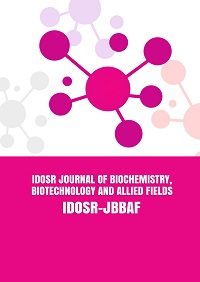Online issues (PUBLICATIONS)
Editorial board Members
Mustafeez Babar
Assistant Professor Shifa Tameer-e-millat University
Stanford University
School of Medicine Pakistan
Dr. M.C. Udeh Sylvester
Department of Biochemistry
University of Nigeria, Nsukka
Abubakar Bawa
Department of Science Laboratory
Technology Federal Polytechnics Mubi
Dr Simeon I. Egba
Department of Biochemistry
Micheal Okpara University of Agriculture, Umudike,
Abia State, Nigeria
Dr. Lingaraj Patro
Professor Department of Zoology and Biotechnology
K.B.D.A.V. College, Nirakarpur, Odisha, India.
Zhongming Zhao
Professor and Director, center for precision Health
University of Texas Health Science Center Houston
Dr Nwaka Andrew Chibuzo
Associate Professor Department of Biochemistry
Anambra State University
Uli, Nigeria.
Dr. Ugwu Chidiebere E.
Department of Human Biochemistry Nnamdi Azikiwe University Awka, Nigeria.
Dr. Ossaih Emmanuel C.
Department of Biochemistry
University of Nigeria, Nsukka
Lecturer Department of Biochemistry Ebonyi State University Abakaliki, Nigeria.
Department of Biochemistry
University of Port Harcourt
Nigeria.
Sam Hyacinth
Managing Editor
Indexing
Eurasian Scientific Journal Index
International Institute of Organized Research (I2OR)
International Services for Impact Factor and Indexing (ISIFI)
International Society for Research Activity (ISRA)
Research Unique Number (RUN)
Cross ref. in process, DOAJ in process, Index Copernicus in process, CAS (A division of American Chemical Society) USA in process, EMBASE (Elsevier products in process), Scopus (Elsevier products in process), EBSCO in process, Thomson Reuters in process, Global Impact Factor in process, Universal Impact Factor in process.
Aims/Scope
IDOSR-Journal of Biochemistry, Biotechnology and Allied Fields (IDOSR-JBBAF) is a peer reviewed journal that is published by International Digital Organization for Scientific Research (IDOSR). The journal publishes original articles in all aspects of Biochemistry, Biotechnology and related fields like Medical Sciences, Microbiology, and Biology. The journal is published both in print and online versions. The journal invites authors to submit their original articles, containing new insights in all aspects of biochemistry, biochemistry and related areas for publication provided that those articles are not published or being considered for publication in another journal. The submitted articles will be subjected to peer review where both general and technical aspects of the submitted papers are reviewed before publication. Review comments may be (i) published unaltered (ii) published with minor revision (iii) published with major revision (iv) rejected. Articles may also be submitted for special issues.
Frequency: 3
Publication dates: January, May and September
ISSN: 2579-0811
Email: idosreditor@idosr.org
Email: idosrjbbaf@idosr.org
INDEXING AND RANKING SITES
I.F.S.I.J Measure of Journal Quality 2021: 5.789
Eurasian Scientific Journal Index
International Institute of Organized Research (I2OR)
International Services for Impact Factor and Indexing (ISIFI)

